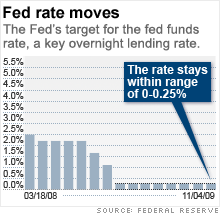Fed stays the course
Central bank keeps rates near zero and says they'll stay there for "extended period" despite recent signs of economic turnaround.


NEW YORK (CNNMoney.com) -- The Federal Reserve kept its key interest rate near zero once again Wednesday. It added in a statement that although the economy continues to improve, it intends to stay the course in recent months.
The Fed's decision came just one week after the government reported that the economy grew in the third quarter, the first gain after a severe decline over the previous four quarters.
While it was widely assumed that the central bank would leave its federal funds rate in a range of 0% to 0.25%, economists and investors were eager to see how the Fed described the economy in its statement.
The Fed repeated language from earlier statements that economic conditions are "likely to warrant exceptionally low levels of the federal funds rate for an extended period."
The federal funds rate is a benchmark used to set the rates paid on a wide range of business and consumer loans, such as home equity lines and credit cards. It has been near zero since December 2008.
The central bank added that low inflation expectations, among other things, justify the low rates. Some critics who are worried about inflation have been urging the Fed to raise rates sooner rather than later.
Stocks fluctuated after the Fed's announcement and gave up much of the day's earlier gains in the last half-hour of trading.
The Fed did trim its plans to purchase debt of mortgage finance firms Fannie Mae (FNM, Fortune 500) and Freddie Mac (FRE, Fortune 500) to $175 billion, down $25 billion from its previously announced target. It is going ahead with plans to buy $1.25 trillion of mortgage securities backed by those firms though, and anticipates completing all the purchases by March.
Those purchases are part of the Fed's efforts -- beyond low interest rates -- to pump money into the economy and the battered housing market.
Some economists have been urging the central bank to detail its plans to unwind the close to $2 trillion it has injected into the markets as part of its efforts to spur economic growth.
Critics of Fed policy worry that if the central bank keeps that much extra money in the economy too long, it could also feed inflation down the road. If there is too much money in the system chasing too few goods, that typically leads to higher prices.
The Fed said it is monitoring the size and composition of its various programs and is prepared to make changes as warranted. But it reiterated that with the current weakness in the economy, "inflation will remain subdued for some time."
While the decision and statement came as no surprise, they did feed into the growing debate among economists about when the Fed will start raising rates.
Michael Strauss, chief economist for Commonfund, an asset manager serving nonprofits, said he doesn't think the Fed will be pushed to raise rates in the near term.
"I think the Fed is willing to take some chances to make sure the recovery really takes hold," he said, adding that the Fed may begin to modestly raise rates in the spring or summer of next year.
But Mark Zandi, chief economist with Moody's Economy.com, said he thinks the central bank will leave rates near zero at least until the end of next year.
He said even if economic growth picks up, there's little reason to raise rates without any signs of inflation on the horizon.
"They've laid down a few markers we can all watch very carefully for when they'll start," he said. "But I think they're a good solid year away from actually raising interest rates." ![]()

